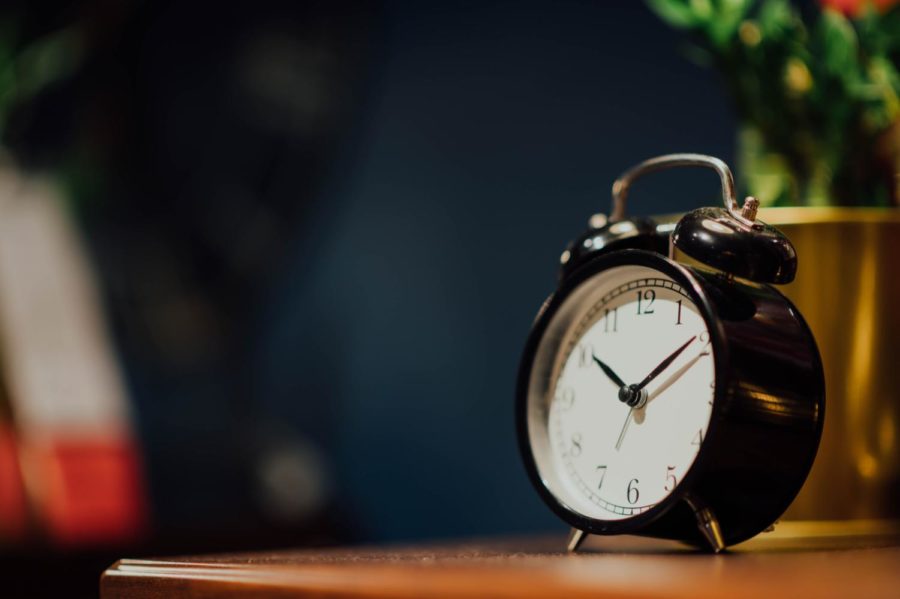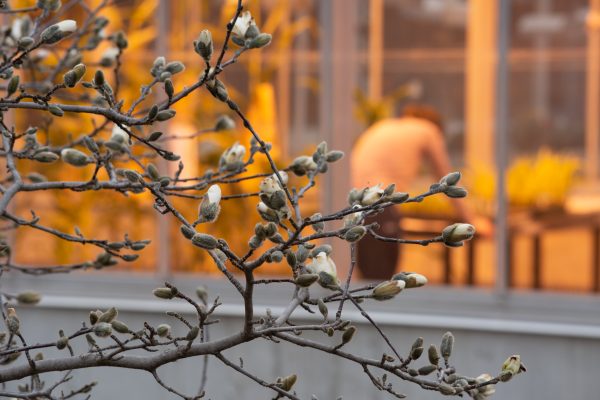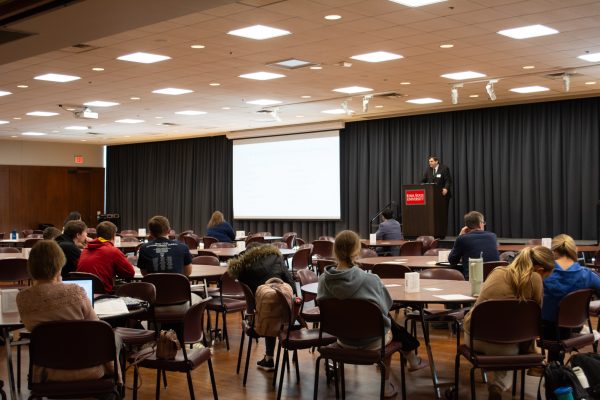Sleep vs. school: What do students prioritize?
The National Sleep Foundation and other national organizations recommend getting seven to nine hours of sleep each night.
11:30 p.m. bedtime; 6 a.m. practice; three days a week. Alaina Breitbach, a member of the swimming and diving team and a senior studying kinesiology and health, will sometimes go through phases of getting five hours of sleep each night.
Brian Vanderheyden, director of student wellness at Iowa State, has observed from both national and local studies that many students struggle with sleep. He cited academic commitments, job schedules and other extracurricular activities as the leading causes.
“We know through research that good sleep is directly tied, it’s like a direct determinant of academic performance,” Vanderheyden said. “It’s connected to learning; it’s connected to student success both inside and outside the classroom and also connects very closely with a lot of other areas of well-being, like mental health and physical health.”
For Leah McClure, a sophomore majoring in pre-interior design, sleep also tends to take a back seat to school. Although she wishes she could sleep more, her current class schedule allows her to get seven hours of sleep each night, on average.
“I try and get eight [hours] but I don’t usually get it, so I usually take naps when I have time during the day,” McClure said.
This sleep pattern falls on the lower end of the seven to nine hour range recommended by groups such as the National Sleep Foundation.
“I have studios for most of the day on pretty much almost every day except for Wednesdays, so then I’m here all day, starting at 8 a.m.,” McClure said.
McClure’s latest class concludes at 3 p.m., giving her time to retreat to her dorm to complete homework assignments and wind down for her typical midnight bedtime.
After learning from his own experiences and conducting some personal research, Evan Walters, a senior studying electrical engineering, understands the importance of sleeping regularly.
“I’m one of the few people that I think really prioritizes sleep over pretty much anything else,” Walters said. “I know a lot of people that get five, six hours of sleep, and I’ve never been able to function when I do that.”
When he began at Iowa State, Walters had a course load ranging anywhere from 16 to 18 credits. Since making the decision to take an extra semester to complete his degree, Walters now takes fewer credits each semester and has found more success with his time management.
“I try to keep a consistent sleep schedule, waking up at the same time every day, going to sleep at the same time and then always aiming for that eight hours,” Walters said. “It’s just how I kind of feel the best.”
“Sleep hygiene” is a term used to describe certain sleep practices, according to Vanderheyden. Finding consistency within one’s sleep schedule is an important component of receiving adequate rest, which ties into a body’s natural 24-hour cycle.
However, finding such consistency can be difficult for individuals with varying daily schedules.
“I think what’s challenging is in a college environment, students’ schedules, through no fault of their own, are a lot of times so different,” Vanderheyden said. “It can be really challenging for college students to really do some of those sleep hygiene behaviors that…are good things to prioritize.”
In addition to her rigorous schedule revolving around school and sports, Breitbach works as a certified nursing assistant at Green Hills Retirement Community and is part of a wellness and exercise lab on campus. On average, she gets six hours of sleep each night.
“I definitely feel it, especially on days when we have double [practices] and weights,” Breitbach said. “I can’t perform to the best of my ability in the pool. I can’t stay focused in class. I feel like I have more of a short fuse…I’m not really myself on the days that I don’t get enough sleep.”
With plans to attend medical school, Breitbach takes her studies seriously. At the moment, she feels as though her academic and athletic obligations are sometimes at odds, making a consistent sleep schedule nearly impossible to achieve.
“Sleep is definitely one of the things that I struggle with the most being a student-athlete,” Breitbach said. “I would say that the people on our team who do have a more regular sleep schedule…typically do perform better in-season. They just are a lot more consistent, whereas for me there are a lot of practices that I have that are just subpar because I’m exhausted.”
Breitbach acknowledges that both her major and her sport make her student-athlete experience especially unique. She has found a way to view these challenges of maintaining balance in a positive light.
“You have to take it with a grain of salt and be kind to yourself because you can’t do 100% all the time,” Breitbach said. “Sometimes, you can give 100% of 25% if that’s all you have in the tank.”
Moving forward, Vanderheyden believes the conversation surrounding people’s sleep habits should be discussed more regularly.
“The things that typically end up on the media or in the news tend to be substance use and big parties or kind of broader mental health or sexual assault,” Vanderheyden said. “When we look at data, actually, [sleep] is one of the most significant issues that students experience, so it’s definitely something that we need to be talking about more.”
Students interested in getting connected with different sleep resources on campus can access information on the Iowa State Student Wellness website.
Your donation will support the student journalists of the Iowa State Daily. Your contribution will allow us to purchase equipment, send our student journalists to conferences and off-set their cost of living so they can continue to do best-in-the-nation work at the Iowa State Daily.












Marc | Apr 12, 2023 at 10:49 pm
Regular sun exposure is also conducive to good sleep. Those who enjoy time in the sun daily sleep more soundly and are able to sleep 45 minutes per night longer. A study by Dr. Julie Gammack exposed test subjects to 30-60 minutes per day of direct sunlight. According to the Saint Louis University health web site, “Nursing home patients who were exposed to natural light had improved sleep quality, less difficulty falling asleep, fewer episodes of wakefulness during the night and greater satisfaction with the amount of sleep they got.” Other research by Dr. Ayoub and colleagues in Alexandria, Egypt demonstrated that there were several factors associated with insomnia among the elderly. Having five or more diseases was associated with a 7.5 times increased risk, anxiety was associated with a 1.9 times increased risk, and depression with a 1.74 times increased risk. Only one factor reduced risk. Sunlight exposure was associated with 43% reduced risk.
More information: sunlightinstitute.org, and read the book, Embrace the Sun.